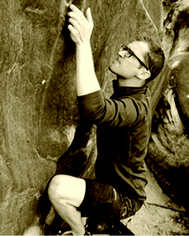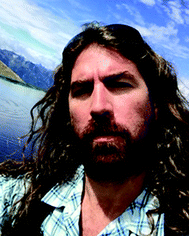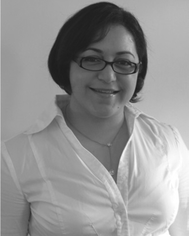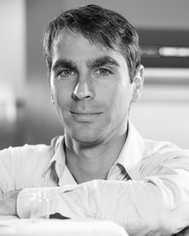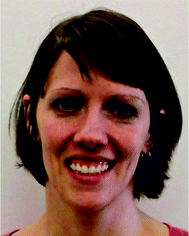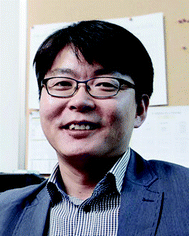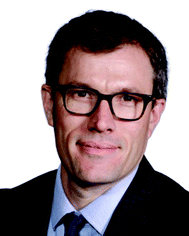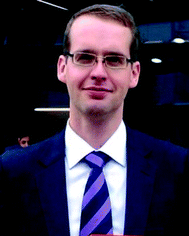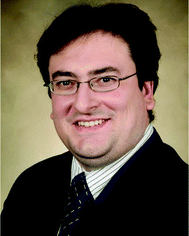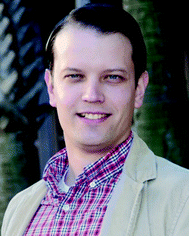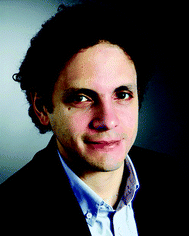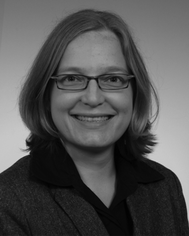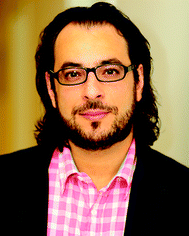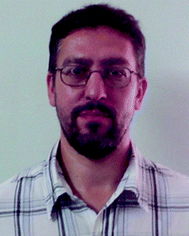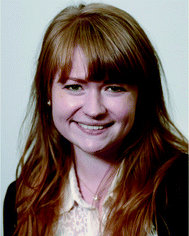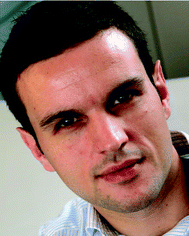DOI: 10.1039/C6TB90055K
(Profile)
J. Mater. Chem. B, 2016, 4, 2995-2998
Profile: Emerging Investigators 2016: novel design strategies for new functional materials
Barry Blight was born in Bathurst, New Brunswick (Canada), and obtained his BSc at Mount Allison University in 2003. He completed his PhD with James Wisner at the University of Western Ontario in 2008. Following his doctoral studies, he moved to the University of Edinburgh as a Marie Curie Postdoctoral Fellow in the group of David A. Leigh, studying new mechanisms of controlled molecular motion and novel hydrogen bonded materials. In 2010 he moved to Queen's University (Canada) as an NSERC Postdoctoral Fellow developing luminescent triarylboron-containing materials with Suning Wang. Barry then accepted a lectureship at the University of Kent in 2013.
Roey Amir was born and raised in Tel-Aviv and after backpacking through North and South America, he began his undergraduate studies at Tel-Aviv University. Roey received a BSc in chemistry and then carried out his PhD research under the guidance Prof. Doron Shabat, working on the development of self-immolative dendrimers. After his PhD, Roey joined the lab of Prof. Craig Hawker as a postdoctoral researcher at the Materials Research Laboratory in UCSB. In 2012, Roey joined The School of Chemistry at TAU as a senior lecturer. His lab designs smart polymers with special focus on enzyme-responsive polymers as building blocks for the formation of smart assemblies.
Dr Theoni Georgiou is currently a Lecturer at the Department of Materials at Imperial College following an RCUK Fellowship at the University of Hull. She obtained a BSc in Chemistry and a PhD in Polymer Chemistry from the University of Cyprus in 2001 and 2006, respectively. In 2006 she joined Professor Tony Mikos' group at Rice University in USA. Her research interests lie in the area of polymer chemistry and in particular in designing well-defined polymeric materials and in investigating how the structural characteristics of the polymers affect the material's end properties and application.
Prof. Marc A. Gauthier obtained his PhD in polymer chemistry at the Université de Montréal in 2007. Following a postdoc at the Swiss Federal Institute of Technology Lausanne (EPFL), he became a Research Associate at the Swiss Federal Institute of Technology Zurich (ETHZ) in 2009. In 2013 he joined the faculty of the Institut National de la Recherche Scientifique (INRS) in Canada where his work focuses on developing new types of dynamic covalent bonds, designing therapeutic protein–polymer conjugates, establishing new technologies for drug discovery, and investigating new opportunities for physically actuating therapeutic bioconjugates.
Danielle Benoit is Associate Professor within the Department of Biomedical Engineering with appointments also in Chemical Engineering and the Centre for Musculoskeletal Research at the University of Rochester. She directs the Therapeutic Biomaterials Laboratory, which specializes in the rational design of polymeric materials for regenerative medicine and drug delivery applications. Her work has provided insights into the translation of tissue engineering strategies for bone allograft repair, development of pH-responsive nanoparticles for nucleic acid and small molecule drug delivery, and novel targeting strategies for bone-specific delivery of therapeutics. Prof. Benoit has received numerous awards for her research program including the 2015 Young Innovator Award in Cellular and Molecular Bioengineering, an NSF CAREER Award, and Alex's Lemonade Stand Young Investigator Award. Prof. Benoit received her undergraduate degree in Biological Engineering from the University of Maine and MS and PhD in Chemical Engineering from the University of Colorado, where she was mentored by Dr Kristi Anseth. She then trained at the University of Washington where she was a Damon Runyon Cancer Research Foundation Postdoctoral Fellow, working with Drs Patrick Stayton and Allan Hoffman. Prof. Benoit joined the faculty at the University of Rochester in 2010.
Professor Hyunhyub Ko is currently an associate professor in Energy and Chemical Engineering at Ulsan National Institute of Science and Technology (UNIST). He received his PhD in Materials Science and Engineering from Georgia Institute of Technology in 2008, MS in Materials Science and Engineering from Iowa State University in 2004, MS in Chemical Engineering from Yonsei University in 2001, and BS in Chemical Engineering from Chung-Ang University in 1999. From 2008 to 2010, he worked at University of California, Berkeley as a postdoctoral fellow in the Department of Electrical Engineering and Computer Sciences. His research interests are in the area of functional nanomaterials for flexible electronics, electronic skins, wearable sensors, and energy devices.
Christopher Bettinger is an Associate Professor at Carnegie Mellon University in the Departments of Materials Science and Engineering and Biomedical Engineering. He directs the laboratory for Biomaterials-based Microsystems and Electronics at CMU, which is broadly interested in the design of novel materials and interfaces that integrate medical devices with the human body. Recent efforts focus on flexible electronics for neural interfaces, edible electronics for ingestible diagnostics and therapeutics. Chris is co-founder and CTO of Ancure, an early stage medical device company. Prof. Bettinger received an SB in Chemical Engineering, an MEng in Biomedical Engineering, and a PhD in Materials Science and Engineering as a Charles Stark Draper Fellow, all from the Massachusetts Institute of Technology. He completed his postdoctoral fellowship at Stanford University in the Department of Chemical Engineering as an NIH Ruth Kirschstein Fellow.
Dr Matthew I. Gibson is an Associate Professor in the Department of Chemistry and Medical School, at the University of Warwick, UK. Matt completed his degree (2003) and PhD (with Prof. Neil R. Cameron, 2007) at the University of Durham, UK. From 2007–2009 he undertook a postdoctoral period with Prof. Harm-Anton Klok at EPFL Switzerland. Matt was appointed to Warwick as a ‘Science City’ research fellow and has since been promoted to Assistant Professor (2012) and Associate Professor (2015). His diverse research team works to use materials and carbohydrate chemistries to address healthcare challenges – particularly cell/tissue cryopreservation and new interventions for infectious disease. His work has been recognized Nnationally and internationally by several awards including 2012 MacroGroupUK Young Researchers Medal, 2015 RSC Dextra Medal, 2015 Polymers for Advanced Technologies Young Talent Prize and is the recipient of an ERC Starting Grant (2014).
Marco Bonizzoni was born in Pavia, a small town in northern Italy. He received undergraduate (2003) and graduate degrees (2007) in chemistry at the University of Pavia, where he discovered supramolecular chemistry working on chemical sensors for anions as a graduate student in Prof. Luigi Fabbrizzi's lab. Dr Bonizzoni then joined Prof. Eric Anslyn's group at The University of Texas at Austin as a postdoctoral fellow (2007), where he tackled new pattern sensing methods. Dr Bonizzoni then joined the Chemistry faculty at The University of Alabama (2010), where his group has been studying the host–guest properties of hyperbranched polyelectrolytes in water, and their applications to the chemical sensing field.
Gregory A. Hudalla is an Assistant Professor in the J. Crayton Pruitt Family Department of Biomedical Engineering in the Wertheim College of Engineering at the University of Florida. He received his BS in Chemical Engineering from the Illinois Institute of Technology, and received his MS and PhD in Biomedical Engineering from the University of Wisconsin, under the guidance of Dr William L. Murphy. Prior to joining the University of Florida, Dr Hudalla was a postdoctoral scholar at the University of Chicago and Northwestern University with Dr Joel H. Collier and Dr Milan Mrksich. Research in the Hudalla lab creates biomaterials via “self-assembly”, the spontaneous organization of molecules into supramolecular architectures. A primary research emphasis is using self-assembly to organize bioactive molecules, such as carbohydrates and proteins, into functional biomaterials for immunomodulation via drug delivery and molecular recognition. Dr Hudalla is the recipient of a 2015 NSF Career award in Biomaterials.
Yuri A. Diaz Fernandez (YDF) received his MSc degree from the Nuclear Science Institute of Havana (Cuba), and his PhD degree from the University of Pavia (Italy). He has several years of research experience on Nanotechnology, Surface Science, Chemistry of Materials, and Colloidal Chemistry applied to antibacterial surfaces, chemical catalysis, and molecular sensing. His research interests also include novel characterization methods for nanomaterials, surfaces, and biological systems, using different electron microscopy techniques and scanning probe microscopy approaches. YDF has been actively working in challenging cross-disciplinary research activities at different institutions across Europe, and he is currently a senior researcher at the Open Innovation Hub for Antimicrobial Surfaces of the University of Liverpool (United Kingdom). He is a member of the Royal Society of Chemistry, a member of the EPSRC Grand Challenge Network for Directed Assembly of Extended Structures with Targeted Properties, as well as a Fellow of the International Centre of Cooperation for Development (CICOPS).
Delia S. Brauer is a junior professor at the Otto Schott Institute of Materials Research, University of Jena, Germany. After finishing her studies in environmental chemistry she completed her PhD on phosphate glasses at the University of Jena. She worked as a postdoctoral researcher at the University of California, San Francisco, Nagoya Institute of Technology, Japan, and Imperial College and Queen Mary University of London, UK, before returning to Jena in 2012. Her research focuses on the structure–property relationship in glasses, with a focus on degradable and highly disrupted glass systems including phosphate glasses and phospho-silicate glasses. She is a member of Technical Committee 04 (Bioglasses) of the International Commission on Glass, a member of the Basic Sciences and Technology Committee of the Society of Glass Technology, Associate Editor of the journal Biomedical Glasses and winner of the Gottardi Prize of the ICG in 2015.
Dr Fiorenzo Vetrone received his PhD degree in Chemistry at Concordia University (Montréal, Canada) in 2005 followed by postdoctoral fellowships funded by the Natural Science and Engineering Research Council (NSERC) of Canada and the Royal Society. He is currently Associate Professor of Nanobiotechnology at Institut National de la Recherche Scientifique, Centre Énergie Matériaux Télécommunications (INRS-EMT), Université du Québec. A pioneer in the field of lanthanide-doped upconverting nanoparticles, the overarching theme of his research group is to develop multi-functional nanoplatforms, excited by near-infrared light, for applications in biology and nanomedicine. He has published over 75 papers in internationally peer-reviewed publications with several ISI highly cited papers. He has given over 90 invited lectures at prestigious conferences, universities and research institutes around the world. He has received a number of prestigious awards from NSERC, IUPAC, the Province of Benevento (Italy) and has been elected as a member of the Global Young Academy.
Martin Federico Desimone was born in 1974 in Buenos Aires, Argentina. He graduated from Pharmacy and Biochemistry at University of Buenos Aires and received his PhD degree from the same University. After a postdoctoral period in the University of the Basque Country, Spain, he joined in 2008 the Laboratoire Chimie de la Matiére Condensée de Paris. He is a CONICET researcher and holds a Full Professor position and is the Vice-director of the Department of Analytical and Physical Chemistry in the Faculty of Pharmacy and Biochemistry at the University of Buenos Aires, Argentina. His current focus is on the design of functional organic, inorganic and biological hybrid materials and the study of interactions on the nano- and microscale for biomedical and biotechnological applications.
Gemma-Louise Davies studied Natural Sciences in Trinity College Dublin in Ireland and remained there to study for a PhD in Chemistry, which she received in 2011. Following a short postdoctoral research fellowship working closely with industry, she moved to the University of Oxford in the UK as a postdoctoral researcher. In 2013, she took up a Global Research Fellowship at the University of Warwick, where she is setting up her independent research lab. Her research currently focuses on the design of nanomaterials for a variety of healthcare and industrial applications; her main interests lie in the development of multi-purpose MRI diagnostic and targeted stimuli-responsive therapeutic delivery vehicles.
Dr Fabio Variola received his Laurea degree in Materials Engineering from the University of Trieste (Italy). Shortly after completion of a joint PhD degree at the INRS-ÉMT/Université de Montréal (Canada), in 2010 he began his independent academic career at the University of Ottawa (Canada). He is now an associate professor cross-appointed in the Departments of Mechanical Engineering, Physics, Cellular and Molecular Medicine. He directs the Surface Nanoengineering Lab, a research environment which focuses on the physicochemical characterization of synthetic and biological surfaces as well as cellular and molecular phenomena. His expertise encompasses materials and surface science, nanotechnology and biophysics, which he combines in a multidisciplinary approach to science. Dr Fabio Variola's research interests range from the investigation of the mechanisms that control cellular response to nanostructured substrates to the development of multifunctional surfaces for applications in regenerative medicine and drug delivery.
| This journal is © The Royal Society of Chemistry 2016 |

